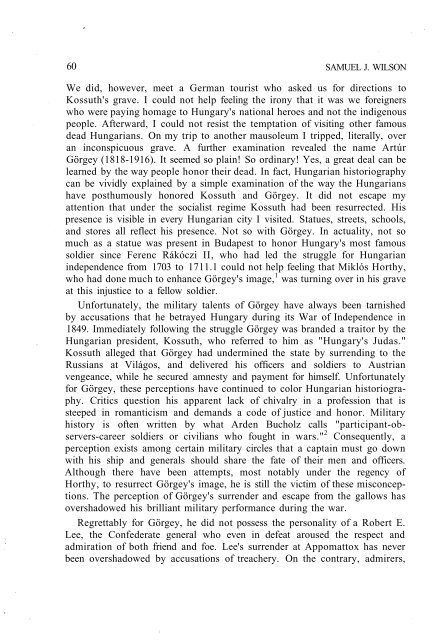60 SAMUEL J. WILSONWe did, however, meet a German tourist who asked us for directions toKossuth's grave. I could not help feeling the irony that it was we foreignerswho were paying homage to Hungary's national heroes and not the indigenouspeople. Afterward, I could not resist the temptation of visiting other famousdead Hungarians. On my trip to another mausoleum I tripped, literally, overan inconspicuous grave. A further examination revealed the name ArtúrGörgey (1818-1916). It seemed so plain! So ordinary! Yes, a great deal can belearned by the way people honor their dead. In fact, Hungarian historiographycan be vividly explained by a simple examination of the way the Hungarianshave posthumously honored Kossuth and Görgey. It did not escape myattention that under the socialist regime Kossuth had been resurrected. Hispresence is visible in every Hungarian city I visited. Statues, streets, schools,and stores all reflect his presence. <strong>No</strong>t so with Görgey. In actuality, not somuch as a statue was present in Budapest to honor Hungary's most famoussoldier since Ferenc Rákóczi II, who had led the struggle for Hungarianindependence from 1703 to 17<strong>1<strong>1.</strong></strong>1 could not help feeling that Miklós Horthy,who had done much to enhance Görgey's image, 1 was turning over in his graveat this injustice to a fellow soldier.Unfortunately, the military talents of Görgey have always been tarnishedby accusations that he betrayed Hungary during its War of Independence in1849. Immediately following the struggle Görgey was branded a traitor by theHungarian president, Kossuth, who referred to him as "Hungary's Judas."Kossuth alleged that Görgey had undermined the state by surrending to theRussians at Világos, and delivered his officers and soldiers to Austrianvengeance, while he secured amnesty and payment for himself. Unfortunatelyfor Görgey, these perceptions have continued to color Hungarian historiography.Critics question his apparent lack of chivalry in a profession that issteeped in romanticism and demands a code of justice and honor. Militaryhistory is often written by what Arden Bucholz calls "participant-observers-careersoldiers or civilians who fought in wars." 2 Consequently, aperception exists among certain military circles that a captain must go downwith his ship and generals should share the fate of their men and officers.Although there have been attempts, most notably under the regency ofHorthy, to resurrect Görgey's image, he is still the victim of these misconceptions.The perception of Görgey's surrender and escape from the gallows hasovershadowed his brilliant military performance during the war.Regrettably for Görgey, he did not possess the personality of a Robert E.Lee, the Confederate general who even in defeat aroused the respect andadmiration of both friend and foe. Lee's surrender at Appomattox has neverbeen overshadowed by accusations of treachery. On the contrary, admirers,
GÖRGEY, LEE, AND PERCEPTIONS 61such as Winston Churchill, write that "Lee was one of the greatest captainsknown to the annals of war." Such statements have not been forthcoming inGörgey's defense. Although Friedrich Engels considered Görgey, along withthe Pole József Bem, to be the most talented commanders of that age, few todayare familiar with Görgey's exploits during the Hungarian War of Independence.According to István Deák, he was "cold, sarcastic, overly modest,puritanical, and contemptuous." 3 Priscilla Robertson states that Görgeydid not care a fig for Hungary in his heart, or for any other ideal... He sneered, openlyor privately, at Kossuth and the government of Hungary, at the common people, at themilitia, at his own soldiers, and even at himself. 4These are not the personal traits which inspire admiraton and devotionamong anyone else but his soldiers. The South could forgive Lee for hisblunder at Gettysburg, but Görgey could never escape the charge that he hadsold his honor and country for a price.Regardless of Görgey's performance in battle and the common sense heshowed in surrender, accolades are never easily given to commanders who losea war - in particular, to an individual such as Görgey, whose contempt forpoliticians and military superiors, such as János Móga and the Pole HenrykDembinski, led him to obstruct, disobey, and interfere with their decisions.Machiavelli wrote "If a general wins a battle it cancels all other errors andmiscarriage." 5 The converse of this statement implies that if a general loses awar, all brilliance, daring, and audacity must be cancelled out by his failure.Charles Fair statesthere have been few men so strategically placed and so overpowering in their authoritythat they were able,... single-handedly, to bring on a general disaster... [and] in defeat,the first concern of those officially responsible is always to shift the blame onto othersand to prove their own conduct to have been above reproach, if not wasted in itsbrilliance. 6As far as Görgey's reputation is concerned, this is an occasion when aunique military leader falls in defeat, losing in the process both the war andhis reputation.Other factors besides generalship can lead to military failure. Command,according to Martin Blumenson,is an art to be mastered, a craft that requires specialized knowledge, a well-developedintuition, high intelligence, and the ability to reason. The process of motivating human
- Page 1 and 2:
Papers of the Radnóti Memorial Con
- Page 3:
HUNGARIAN STUDIESVOLUME 11, 1996 CO
- Page 8 and 9:
6 GEORGE GÖMÖRIprobably Fürst an
- Page 10 and 11:
8 GEORGE GÖMÖRIof the utmost impo
- Page 12 and 13: 10 GEORGE GÖMÖRIén e földön...
- Page 14 and 15: 12 GEORGE GÖMÖRINotes1. Miklós R
- Page 16 and 17: 14 MIHÁLY SZEGEDY-MASZÁKself alwa
- Page 18 and 19: 16 MIHÁLY SZEGEDY-MASZÁKtype is r
- Page 20 and 21: 18 MIHÁLY SZEGEDY-MASZÁKpose, the
- Page 22 and 23: 20 MIHÁLY SZEGEDY-MASZÁK"Wozu Dic
- Page 24 and 25: 22 MIHÁLY SZEGEDY-MASZÁKand Wilme
- Page 26 and 27: 24 MIHÁLY SZEGEDY-MASZÁKbeen the
- Page 28 and 29: 26 MIHÁLY SZEGEDY-MASZÁKBolond, k
- Page 30 and 31: 28 MIHÁLY SZEGEDY-MASZÁK6. Emery
- Page 32 and 33: 30 ZSUZSANNA OZSVÁTHand breaks as
- Page 34 and 35: 32 ZSUZSANNA OZSVÁTHThe drama echo
- Page 36: 34 ZSUZSANNA OZSVÁTHcontinents at
- Page 39 and 40: FROM CAIN TO NAHUM 37which, as Csap
- Page 41 and 42: \FROM CAIN TO NAHUM 39and bears and
- Page 43 and 44: FROM CAIN TO NAHUM 41who sees what
- Page 45 and 46: FROM CAIN TO NAHUM 438. "A félelme
- Page 47 and 48: HELP ME, PASTORAL MUSE:THE VIRGELIA
- Page 49 and 50: HELP ME, PASTORAL MUSE 47compete! W
- Page 51 and 52: HELP ME, PASTORAL MUSE 49of a priva
- Page 53 and 54: HELP ME, PASTORAL MUSE 51Once again
- Page 55 and 56: HELP ME, PASTORAL MUSE 53Eighth Ecl
- Page 57 and 58: HELP ME, PASTORAL MUSE 55have that
- Page 59: HELP ME, PASTORAL MUSE 57Paul de Ma
- Page 64 and 65: 62 SAMUEL J. WILSONbeings and contr
- Page 66 and 67: 64 SAMUEL J. WILSONHungarians would
- Page 68 and 69: 66 SAMUEL J. WILSONthe Austrians. G
- Page 70 and 71: 68 SAMUEL J. WILSONnorth-eastern Zi
- Page 72 and 73: 70 SAMUEL J. WILSONoriginally pursu
- Page 74 and 75: 72 SAMUEL J. WILSONGörgey's decisi
- Page 76 and 77: 74 SAMUEL J. WILSONfrom occurring,
- Page 78 and 79: 76 SAMUEL J. WILSON8. Artúr Görge
- Page 80 and 81: 78 STEVEN TÖTÖSY de ZEPETNEKtört
- Page 82 and 83: 80 STEVEN TÖTÖSY de ZEPETNEKThe c
- Page 84 and 85: 82 STEVEN TÖTÖSY de ZEPETNEKher u
- Page 86 and 87: 84 STEVEN TÖTÖSY de ZEPETNEKthe b
- Page 88 and 89: 86 STEVEN TÖTÖSY de ZEPETNEKrooti
- Page 90 and 91: 88 STEVEN TÖTÖSY de ZEPETNEKcriti
- Page 92 and 93: 90 STEVEN TÖTÖSY de ZEPETNEK'My f
- Page 94 and 95: 92 STEVEN TÖTÖSY de ZEPETNEKshe d
- Page 96 and 97: 94 STEVEN TÖTÖSY de ZEPETNEKNotes
- Page 99 and 100: BERLIN ET PARIS DE LAJOS TIHANYIVAL
- Page 101 and 102: BERLIN ET PARIS DE LAJOS TIHANYI 99
- Page 103 and 104: BERLIN ET PARIS DE LAJOS TIHANYI 10
- Page 105 and 106: BERLIN ET PARIS DE LAJOS TIHANYI 10
- Page 107 and 108: BERLIN ET PARIS DE LAJOS TIHANYI 10
- Page 109 and 110: BERLIN ET PARIS DE LAJOS TIHANYI 10
- Page 111 and 112: BERLIN ET PARIS DE LAJOS TIHANYI 10
- Page 113 and 114:
BERLIN ET PARIS DE LAJOS TIHANYI 11
- Page 115:
BERLIN ET PARIS DE LAJOS TIHANYI 11
- Page 118 and 119:
116 KEVIN E. KELLYfilms Lugosi made
- Page 120 and 121:
118 KEVIN E. KELLYthe provinces, no
- Page 122 and 123:
120 KEVIN E. KELLYWith his brief an
- Page 124 and 125:
122 KEVIN E. KELLYboth his and Dean
- Page 126 and 127:
124 KEVIN E. KELLYfollowed it into
- Page 128 and 129:
126 KEVIN E. KELLYvampiric nobleman
- Page 130 and 131:
128 KEVIN E. KELLYThe film also boo
- Page 132 and 133:
130 KEVIN E. KELLYWood remained one
- Page 134 and 135:
132 KEVIN E. KELLYLugosi, convinced
- Page 136 and 137:
134 KEVIN E. KELLY19. Lennig, 112-1
- Page 139 and 140:
THE AGON OF IRONY AND SATIREIN GYÖ
- Page 141 and 142:
THE AGON OF IRONY AND SATIRE 139poe
- Page 143 and 144:
THE AGON OF IRONY AND SATIRE 141tra
- Page 145 and 146:
THE AGON OF IRONY AND SATIRE 143fek
- Page 147 and 148:
THE AGON OF IRONY AND SATIRE 145ner
- Page 149 and 150:
THE AGON OF IRONY AND SATIRE 147whi
- Page 151 and 152:
THE AGON OF IRONY AND SATIRE 149mov
- Page 153 and 154:
THE AGON OF IRONY AND SATIRE 151for
- Page 155 and 156:
THE AGON OF IRONY AND SATIREA harma
- Page 157 and 158:
MURDER IN THE MOUNTAINSTranslated b
- Page 159 and 160:
MURDER IN THE MOUNTAINS 157"Afraid?
- Page 161 and 162:
MURDER IN THE MOUNTAINS 159Abády,
- Page 163 and 164:
MURDER IN THE MOUNTAINS 161"The mar
- Page 165 and 166:
MURDER IN THE MOUNTAINS 163Bálint
- Page 167 and 168:
MURDER IN THE MOUNTAINS 165"That is
- Page 169 and 170:
MURDER IN THE MOUNTAINS 167at hand,
- Page 171 and 172:
CONTRIBUTORSMiklós BÁNFFYLászló
















